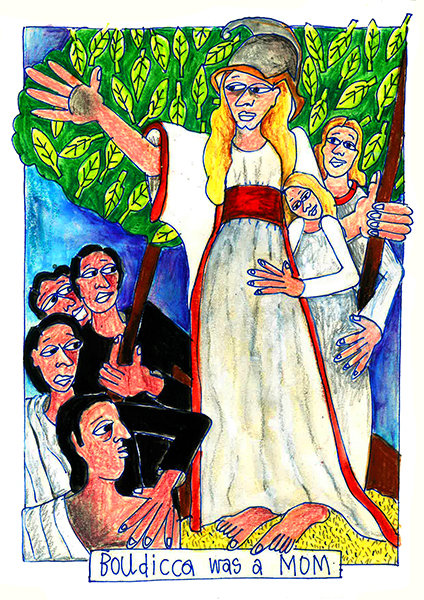for Dorit, χρόνια πολλά
The Roman Empire, addicted to expansion and wealth, wanted Britain’s tin and the land that went with it. In 54 BC, Julius Caesar invaded Britain. The locals were not prepared for such an overwhelming military force. Britain at the time was full of small kingdoms. To avoid conflict and loss, many leaders became “client kings”. That is, in exchange for their loyalty to Rome, the kings would be permitted to maintain some degree of sovereignty. Accommodating client kings generally became wealthy making this compromise all the easier to accept. This form of governing went on for almost 100 years. But that all changed in 60 AD.
Claudius became Roman emperor in 41 AD. He was physically awkward as he limped and had difficulties hearing. Romans liked their men to be macho so the wimpy Claudius was snubbed by his contemporaries. That is, until Caligula was assassinated. Claudius, the only adult male remaining in the family, became Emperor. Despite being an efficient administrator, Claudius had enemies including his wife (and niece), Agrippina the Younger, who was also the sister of Caligula and the mother of Nero.
After their marriage, Claudius adopted Nero as his son. Big mistake. Once Agrippina moved into the palace, she took over. Her deleterious relationship with power convinced her to feed her husband poisonous mushrooms so her son, Nero, could become emperor.
In 54 AD at the age of 16, Nero became Emperor of the Roman Empire. Although he had little interest in ruling the empire, he had much interest in spending the Empire’s money.
Momma Agrippina was just as greedy as her son. And just as sleezy. She had a libido out of whack having sexual relationships with her uncle, her brother, and her son. Agrippina used sex as a means of maintaining control. But Nero grew tired of his mom’s interference so he had her killed.
Nero and Agrippina
In 60 AD, Prasutagus, king of the Celtic tribe, Iceni, died. He’d been a client king and, hoping to avoid conflict for his people, he declared that his daughters, along with Nero, would rule the Iceni. But Nero, a greedy spendthrift, decided he wanted all of Prasutagus’ wealth and property. He did not honor the terms of Prasutagus’ will and, instead, Nero sent Roman soldiers to take charge of Prasutagus’ patrimony. And as they pillage and plundered, the Romans also stripped and flogged Boudica, wife of Prasutagus and Queen of the Iceni before raping her daughters.
Now Boudica was a mom. Not a mom like Agrippina but a normal mom who was bound to protecting and defending her children. The violence and humilation her daughters had been subjected to gave her a super power she vowed to use to destroy the Romans and their allies. After uniting the other Celtic tribes to make a passionate speech about the need to reappropriate themselves of their own territory and their own culture, Boudica declared war on the Romans.
Fueled by a mother’s rage, Boudica led her troops to victory, successfully razing to the ground three major Roman controlled towns (including modern-day London). Not only had the Romans been humiliated, they’d been humiliated by a woman. Nero foamed at the mouth while ordering the Roman governor of Britain, Suetonius Paulinus, to obliterate Boudica and her people.
The Romans were brutal and destroyed everything they could. Boudica, seeing her defeat, reacted like Cleopatra. She and her daughters drank a poisoned cocktail because they knew it was better to be dead than to be a prisoner of the Roman army.
In The Gallic Wars, Caesar wrote that the Druids concerned themselves with all things sacred as well as in settling disputes decreeing both rewards and punishments. There were various groups of Druids each group having its own leader.
All Druids were Celts but not all Celts were Druids.
Most of what is known about the Druids comes from the Romans. The Romans were keen on writing the history for themselves and others. Because it was also a form of propaganda. The Druids were literate, but it was against their religion to write down the knowledge meant only for priests and sacred scholars. The Druid need for secrecy is reminiscent of the Eleusinian mysteries.
There were three categories of Druids: Druids the philosophers, Ovates the healers/seerers, and Bards the singers/storytellers.
Many of the Bards lived in Wales. So is it any wonder that the Welsh have an excellent choir tradition? Or any wonder that Tom Jones is from Wales?
-30-
Related: The Celtic Origins of Mistletoe + Druids in History Maria Palmer + Women in Druidry + Were There Female Druids? + Regarding Female Druids + Druidism and Female + Ancient druids of Wales + Twilight of the Druids, Madness of Emperors + The mysterious history of druids, ancient ‘mediators between humans and the gods’ + the Bards of Wales + Who was Nero? British Museum +









That was so darn interesting! Thank you.
Thanks Yvonne. Have you see the British series Time Team? They make British history fascinating.
I will see if I can find that, Cynthia.
It’s on YouTube!
Pingback: To Myself | The Narrative Within